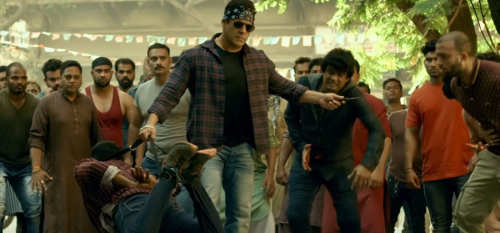MOVIE REVIEW
Radhe: Your Most Wanted Bhai (2021)
“Radhe: Your Most Wanted Bhai” adapts Kang Yoon-sung’s 2017 Korean film, “The Outlaws,” into a star vehicle for Salman Khan. As a turf war escalates between two rival gangs, a ruthless newcomer angles to take over. It’s up to the roguish cop, the titular Radhe (Mr. Khan), to restore peace. While the original was based on actual events that took place in 2004, the Bollywood remake seems so extravagant that few traces of reality remain. Both Radhe and the antagonist, Rana (Randeep Hooda), are utterly indestructible; this is precisely the kind of action flick that Takashi Miike had in mind when he made the cartoonish “Dead or Alive.”
In addition to music video-like musical numbers – complete with glamour inserts seemingly taken out of haircare product adverts – the most distinctive changes in the remake revolve around the addition of Diya (Disha Patani), a model who happens to be the sister of Radhe’s pompous superior, Avinash (Jackie Shroff). Her existence not only helps facilitate all the synchronized song and dance, but also prompts Radhe to gratuitously expose his massive shaved pecs as part of his modeling audition.
While his Korean counterpart, Ma Dong-seok, is an unassuming everyday hero, Mr. Khan is here in full Planet Hollywood trio (Stallone/Willis/Schwarzenegger) mode. Some of the more unflattering plotlines have been reassigned to Mr. Shroff, who gets to pass out in a club’s V.I.P. room after a gangster tries to curry favors with pricy liquor and escorts. Given that he’s apparently the designated comic relief, the film creates its own unique embarrassing moments just for him – but he does look quite sexy in a red spaghetti dress originally meant for Ms. Patani.
Another major change is that “The Outlaws” specifically centers on Chinese gangs in Seoul, while “Radhe” shifts its focus to drug dealers in Mumbai. There’s a scene in the original involving Mr. Ma’s Ma Seok-do enlisting Chinatown residents as informants. In the remake, Radhe deploys Mumbai youths instead. The film goes overboard with a corny DARE-esque public service announcement with Radhe giving Avinash a tour of a rehab center where he seems to know every patient by name and their affliction by heart.
While screenwriters A. C. Mugil and Vijay Maurya have translated several scenes verbatim, they lack the original’s suspense due to the remake’s over-the-topness. The climactic showdown in a men’s room is copied and even choreographed precisely here, yet that’s not enough. “Radhe” has to kick it up another notch with a fight scene inside a spiraling helicopter. By the time it concludes with yet another musical number, it’s doubtful anyone has taken its anti-drug message to heart.

Comments